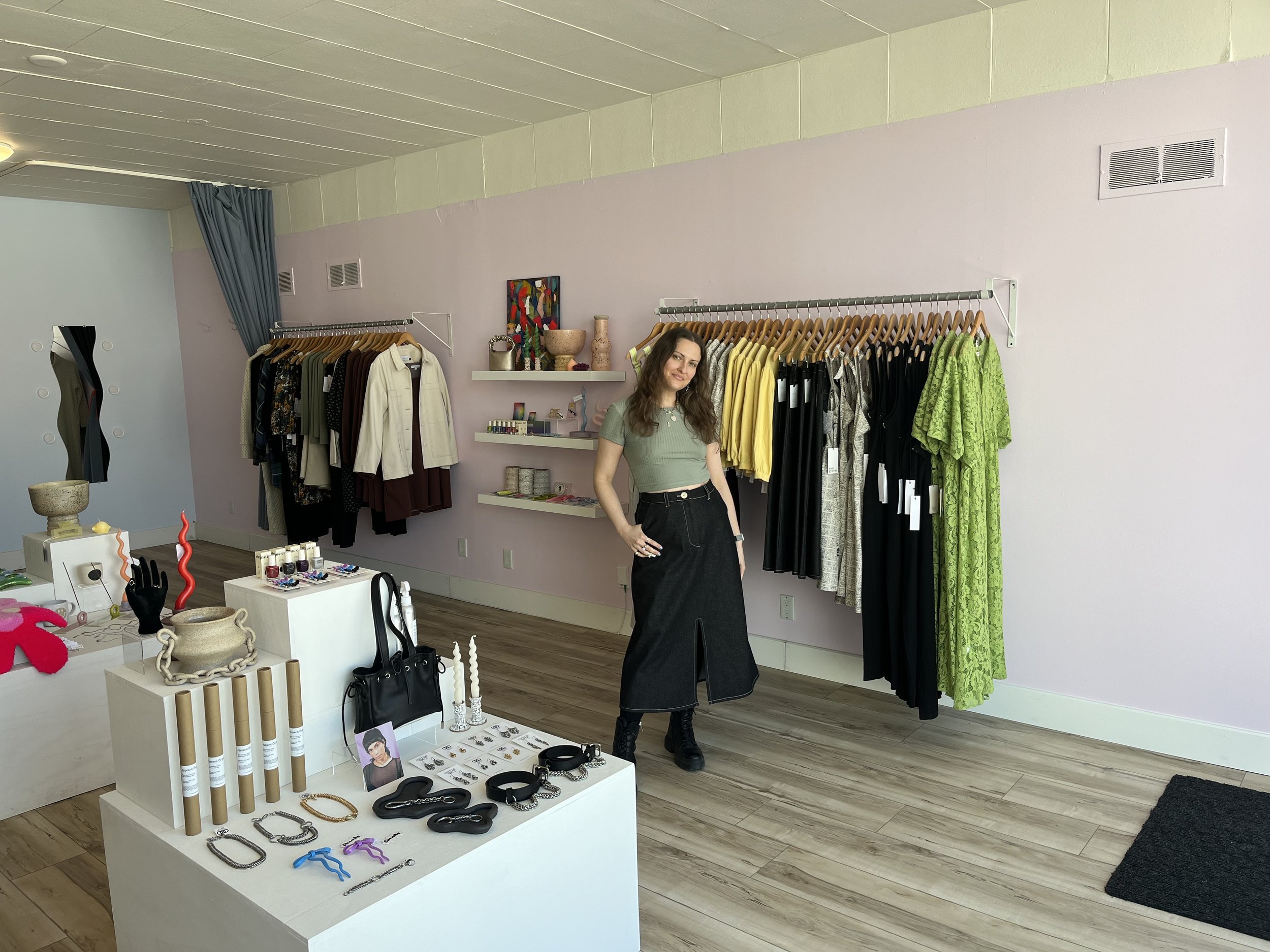Landing & Co. The Slow Fashion Oasis
by Ashton Carter
Earlier this week, I spoke with Sarah and Geoff Tresidder, newcomers to the Soo and the owners of Landing & Co., a slow fashion & lifestyle boutique operating out of 112 March Street. Next door to Lil’s Asian Cuisine and adjacent to Silver Threads, though still technically in the transition stage, the boutique itself is a breezy, open, light space with a clear emphasis on aesthetics and the DIY-core of small, local Canadian business.
Originally popping up from St. Joseph’s Island, Sarah and Geoff have come to town to bring their slow fashion dream into the mainstream with an emphasis on ethical and sustainable Canadian-owned makers and brands. I had a few questions for them.
What inspired you to start your own slow fashion & lifestyle business?
S: I worked for a number of years at a slow fashion boutique. Before that, I was working in fast fashion. I had worked at Suzy Shier for almost a decade and I loved the retail vibe. I loved the customer service aspect, the clothes, the fashion and everything - but I had never really thought about slow fashion versus fast fashion or the ethics and sustainability behind slow fashion. We wanted to start a business for a number of years, we wanted to be our own bosses. We saw that model of boutique work and decided that doesn’t exist here, so let’s try slow fashion for the Soo.
What is “fast fashion” versus “slow fashion”?
S: Fast fashion is quantity over quality. Things are made cheaply without human rights in mind, without the environment in mind, without sustainability in mind whatsoever. So you end up with a lot of waste, too. With slow fashion, things are made very intentionally, with the people and planet in mind, and so you don’t necessarily get as much quantity but what you are getting is quality. It’s important in this day and age with climate change and the economy to keep that in mind and to really think about who made my clothes, are they being paid properly, do they work in humane conditions, etc.
People are trained to think that clothing is disposable and it should be cheap. How we think of it is: why does that sweater at H&M cost so little? It’s because the people who make it aren’t being paid fairly, it’s because of a lot of exploitation.
What is something valuable you’ve learned as a business professional in this industry?
G: I would say how difficult it is. A lot of people are not necessarily open about how difficult it is. You hear a lot of positive stories but you don’t hear about people struggling. Being able to weather the good times and the bad times is critical to your success.
As a woman in business, what is your take on the way forward as you see it?
S: What I like that I see is that there’s a lot of community - there’s a lot of women getting together and supporting each other. What I don’t like is this idea of being a ‘girlboss’. I’m just a business person. I am a woman in business but I’m also just a person. I shouldn’t have to say that.
Do you have any tips or tricks for aspiring entrepreneurs?
S: Consignment is important. There’s wholesale and then there’s consignment. Wholesale is all about minimums and there’s money up-front and you hope to sell the stuff. Consignment means the brand is sending us the clothing with an agreement that when we sell something, we get a percentage and they get a percentage. So we’re only spending money when we make a sale.
Do you have any final comments?
S: We’re here for people who have fun getting dressed everyday for themselves, who view their outfits as an act of personal expression, and in many cases view their personal style an answer to the mundanity of the status quo. This is a shop for the sustainable baddies in SSM - we see you! And we know that not only do you care, you know that curating a sustainable lifestyle is cool.
Our style is fun and fashion forward, so really that applies to everyone, to anyone who has an appreciation for contemporary design and fashion. We feel it’s so important to never limit yourself based on perceived societal expectations of your demographic.
—
When you ask people living in the Algoma region what matters most to them about the economy, you’ll most likely get an answer that involves affordability. Beyond this key marker, people care about their communities and the land itself. They care about their families, their jobs, and the degree to which they are able to provide for themselves and their loved ones. People from this part of the world value the beauty and sanctity of nature, which surrounds and supports our ways of life and has for thousands of years.
“Slow fashion” is the opposite of “fast fashion” and includes fashion & lifestyle brands that prioritize quality over quantity. They choose makers and manufacturers who use renewable, environmentally-friendly materials to make their products and often acquire, whether through wholesale or consignment, locally made and manufactured goods - sometimes (but not always) at a higher cost. Slow fashion brands value ethical labour and therefore go out of their way to stock products made by labourers who are compensated fairly for the work they do. Many slow fashion outfitters are locally owned small to medium-sized businesses.
In addition to providing jobs to other community members and being a part of the community themselves, slow fashion outfitters reinvest a great deal of their wealth back into the local economy by directly contributing to the distribution of goods made and sourced by other local makers and manufacturers. The commercial goal of slow fashion is to foster a healthy economic balance between supply and demand while also building the symbology of the brand and the placenames in which they live and operate.
Conversely, fast fashion brands make large quantities of cheap, low-quality clothing and generate repeat customers through a combination of aggressive marketing, social engineering, and planned obsolescence. Most fast fashion brands choose foreign manufacturers with questionable ethical standards because it is cheaper than paying workers a fair wage, in addition to choosing manufacturers who do not comply with environmental best practices because it is cheaper and/or easier to manufacture clothing without the constraints of environmentally-conscious manufacturing processes.
As a primarily transactional business, fast fashion doesn’t fuel community economic growth beyond the few jobs it creates because they do not contribute to the distribution of local makers and manufacturers nor are they based in the communities in which they establish their beachheads. There is no commercial investment incentive because their goal is to extract wealth from the community, not grow it.
To put the comparison into a lived perspective, it is the difference between a winter jacket that lasts a single year of wear versus one that lasts many multiple years of wear. The initial lower cost of fast fashion is meant to give consumers the impression of affordability - it is, in fact, more expensive, as clothing you have to constantly replace costs more in the long run. This is how fast fashion brands make their billions and leave everyone else out in the cold. This practice goes beyond “clever marketing” - it is psychological manipulation founded on years of social engineering and socio-economic research.
The contention that our everyday-use items such as clothing and household decor “used to be more real” is only partly true. While there has been an up-tick in the spread of fast fashion and other fast business brands over the last several decades, there are always going to be local businesses offering well-made products that are designed with the care and skill to last. When you choose to shop locally, you are essentially paying yourself back for everything you buy because more than 60% of every dollar you spend is infused back into the local economy. The fast fashion industry, beyond a meagre 10% return investment to the community, generates some of the highest amounts of waste across the globe. In 2023, it produced a cumulative 97 million tonnes of waste and is responsible for 20% of the global waste water.
So here’s the picture: we live in a time of unprecedented economic struggle for many Canadians. It is important, now more than ever, to make informed, educated decisions about where we spend our money. We should consider the difference between a business that seeks only to profit from our community and a business that is a part of our community, contributing to and improving upon the local economy in which we live. Fast fashion is poisonous to our community, the land, and our economy. If we want our beloved Algoma region to remain a beautiful and prosperous place to live, this is just one way we can safeguard that future for ourselves and generations to come.

